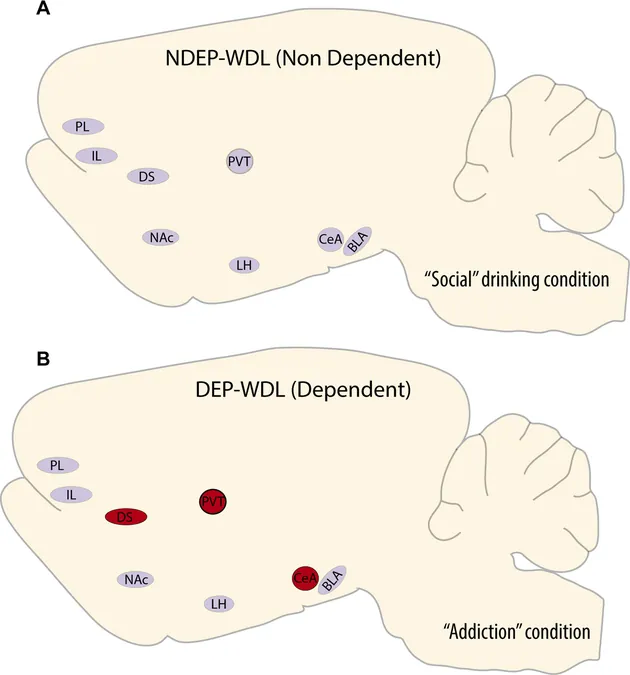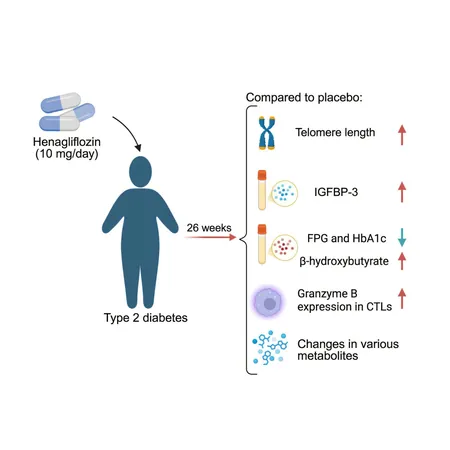
Unlocking the Secrets of Alcohol Addiction: New Research Uncovers Brain's Key Role in Relapse
2025-09-13
Author: Arjun
What Drives Alcohol Addiction?
Ever wondered why some people can't seem to break free from alcohol, even when faced with serious health risks? A groundbreaking study from Scripps Research reveals a crucial clue involving a tiny brain region that plays a pivotal role in the cycle of addiction and withdrawal.
The Brain's Hidden Mechanism of Relapse
In a study published in *Biological Psychiatry: Global Open Science*, researchers focused on the paraventricular nucleus of the thalamus (PVT) in rats. They discovered that this brain area becomes highly active when rats associate environmental cues with the relief of withdrawal symptoms through alcohol consumption. This finding highlights a troubling aspect of addiction: drinking not for pleasure, but as an escape from pain.
Friedbert Weiss, a professor of neuroscience at Scripps and senior author of the study, explained, "People aren’t merely chasing a high; they are also trying to eliminate powerful negative feelings like stress and anxiety that come with withdrawal. Our research reveals the brain systems that lock in these associations, explaining why relapse can be so persistent."
A Glimpse into the Rat's Brain
The study's authors used advanced imaging techniques to explore the rats' brains, pinpointing which areas became more active in response to alcohol cues. They meticulously analyzed four groups: rats that experienced withdrawal and learned alcohol provided relief, and three control groups who hadn’t undergone the same observations.
Among the various active brain regions, the PVT was particularly pronounced, known for its involvement in stress and anxiety. Hermina Nedelescu, co-senior author, stated, "Every rat that underwent withdrawal-related learning showed significant activity in this brain area, solidifying its role in linking alcohol with stress relief—potentially reshaping our understanding of relapse dynamics."
Broader Implications Beyond Alcohol
With around 14.5 million Americans grappling with alcohol use disorder, the significance of this research extends far beyond just booze. The findings could apply to various behavioral issues, including anxiety disorders and trauma-related responses. Nedelescu noted, "This research could pave the way not just for tackling alcohol addiction but also for addressing other dysfunctional cycles in human behavior."
As scientists continue to delve deeper, upcoming studies might focus on female subjects and the specific neurochemicals involved in stress relief associated with withdrawal. Identifying these molecules could lead to innovative drug therapies targeting the roots of addiction.
A Paradigm Shift in Understanding Addiction
This study marks a crucial shift in how addiction is perceived. Historically, many have seen addiction as merely a pursuit of pleasure. However, Weiss points out, "It's equally about escaping negative feelings. Understanding the neurological foundations of this learning process represents significant progress in combating addiction."
As this captivating research unfolds, it promises to illuminate new pathways for treatment and recovery, propelling our understanding of addiction towards a revolution.


 Brasil (PT)
Brasil (PT)
 Canada (EN)
Canada (EN)
 Chile (ES)
Chile (ES)
 Česko (CS)
Česko (CS)
 대한민국 (KO)
대한민국 (KO)
 España (ES)
España (ES)
 France (FR)
France (FR)
 Hong Kong (EN)
Hong Kong (EN)
 Italia (IT)
Italia (IT)
 日本 (JA)
日本 (JA)
 Magyarország (HU)
Magyarország (HU)
 Norge (NO)
Norge (NO)
 Polska (PL)
Polska (PL)
 Schweiz (DE)
Schweiz (DE)
 Singapore (EN)
Singapore (EN)
 Sverige (SV)
Sverige (SV)
 Suomi (FI)
Suomi (FI)
 Türkiye (TR)
Türkiye (TR)
 الإمارات العربية المتحدة (AR)
الإمارات العربية المتحدة (AR)